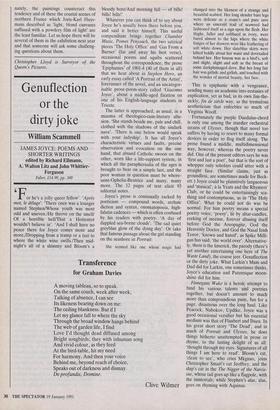Genuflection or the dirty joke
William Scammell
JAMES JOYCE: POEMS AND SHORTER WRITINGS edited by Richard Ellmann, A. Walton Litz and John Whittier- Ferguson Faber, £14.99, pp. 300 For he's a jolly queer fellow'. `Apres mot, le deluge'. 'There once was a lounger named Stephen/Whose youth was most odd and uneven./He throve on the smell/ Of a horrible hell/That a Hottentot wouldn't believe in'. 'And I shall have no peace there for Joyce comes more and more,/Dropping from a tramp or a taxi to where the white wine swills./Then mid- night's all of a shimmy and Bloom's a bloody bore/And morning full — of bills! bills! bills!'
Whatever you can think of to say about Joyce he's usually been there before you, and said it better himself. This useful compendium brings together Chamber Music, Pomes Penyeach, the two satirical pieces 'The Holy Office' and 'Gas From a Burner' (far and away his best verse), occasional poems and squibs scattered throughout the correspondence, the prose `Epiphanies' of 1901-4 (40 of them in all) that we hear about in Stephen Hero, an early essay called 'A Portrait of the Artist', forerunner of the novel, and an uncategor- isable prose-poem-story called 'Giacomo Joyce', about a middle-aged fixation on one of his English-language students in Trieste.
The latter is approached, as usual, in a miasma of theologico-cum-literary allu- sion. 'She stands beside me, pale and chill, clothed with the shadows of the sindark nave'. 'There is one below would speak with your ladyship'. It has all Joyce's characteristic virtues and faults, precise observation and evocation on the one hand, that absurd Catholic swoon on the other, worn like a life-support system, in which all the paraphernalia of the ages is brought to bear on a simple lust, and the poor woman in question must be whore- saint-Ophelia-Beatrice and many, many more. The 12 pages of text elicit 93 editorial notes.
Joyce's prose is continually racked by poeticism — compound words, archaic diction and syntax, onomatopoeia, high- falutin cadences — which is often confused by his readers with poetry. 'A day of dappled sea-borne clouds'. 'The sad quiet greyblue glow of the dying day'. Or take that famous passage about the girl standing on the seashore in Portrait:
She seemed like one whom magic had changed into the likeness of a strange and beautiful seabird. Her long slender bare legs were delicate as a crane's and pure save where an emerald trail of seaweed had fashioned itself as a sign upon the flesh. Her thighs, fuller and softhued as ivory, were bared almost to the hips where the white fringes of her drawers were like feathering of soft white down. Her slateblue skirts were kilted boldly about her waist and dovetailed behind her. Her bosom was as a bird's, soft and slight, slight and soft as the breast of some darkplumaged dove. But her long fair hair was girlish: and girlish, and touched with the wonder of mortal beauty, her face.
This is epiphanic with a vengeance, sending many an academic into ecstasies of explication, yet as bad, in its own Jim-the- sickly, fin de siecle way, as the tremulous aestheticism that enfeebles so much of Virginia Woolf.
Fortunately the purple Daedalus-chord is only one among the sturdier orchestral strains of Ulysses, though that novel too suffers by having to resort to many formal devices in order to flog itself along. The prose found a middle, multidimensional way, however, whereas the poetry never did. One of the present editors says he was `first and last a poet', but that is the sort of whopper only scholars could utter with a straight face. (Similar claims, just as groundless, are sometimes made for Beck- ett.) Joyce could be plaintively languorous and 'musical', a la Yeats and the Rhymers' Club, or he could be entertainingly sca- thing and contemptuous, as in 'The Holy Office'. What he could not do was be normal. For him poetry means a special poetry voice, 'poesy', lit by altar-candles, reeking of incense, forever abasing itself before God the Areopagite, God the Heavenly Doctor, and God the Nasal Irish Tenor, 'known and hated', as Spike Milli- gan has said, 'the world over'. Alternative- ly, there is the limerick, the parody (there's yet another entertaining one here of The Waste Land), the coarse jeer. Genuflection or the dirty joke. What Larkin's Mum and Dad did for Larkin, one sometimes thinks, Joyce's education and Pateresque moon- shine did for him.
Finnegans Wake is a heroic attempt to bind his various talents and poetries together, but doesn't amount to much more than compoundious puns, fun for a page, disastrous over the long haul. Like Peacock, Nabokov, Updike, Joyce was a good occasional versifier but his essential medium was that of Flaubert and Ibsen. In his great short story The Dead', and in much of Portrait and Ulysses, he does things hitherto unattempted in prose or rhyme, to the lasting delight of us all: `thought through my eyes. Signatures of all things I am here to read'. Bloom's cat, `clean to see', who cries Mkgnao, joins Christopher Smart's cat Jeoffrey, and the ship's cat in the The Nigger of the Narcis- sus, whose tail goes up like a flagpole, with the immortals; while Stephen's alas, alas, goes on rhyming with Aquinas.


















































 Previous page
Previous page